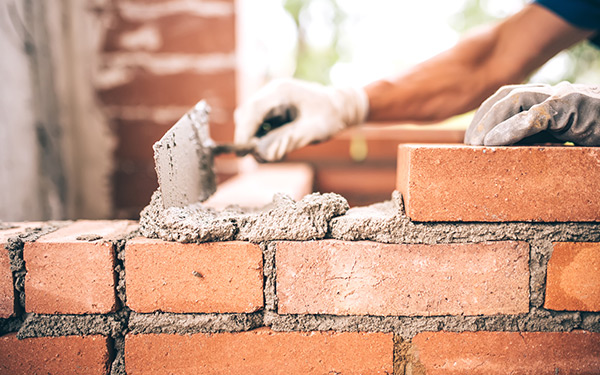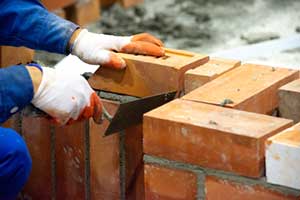Trusted Tuckpointing Services for Fixing Brick and Stone Surfaces
Trusted Tuckpointing Services for Fixing Brick and Stone Surfaces
Blog Article
Opening the Tricks of Lasting Masonry Building Practices for Eco-Friendly Buildings
In the realm of modern building and construction, the search of lasting techniques has actually become paramount. Among the myriad approaches to environmentally friendly building, sustainable stonework building attracts attention as a time-tested and durable technique that holds a riches of untapped potential. From the option of materials to cutting-edge construction strategies, the tricks to achieving sustainability within stonework building are complex and appealing. By exploring the advantages, materials, strategies, and future patterns of lasting masonry, a much deeper understanding of how these techniques can shape the future of eco-friendly structures emerges.
Advantages of Lasting Stonework Construction
Embracing lasting stonework building and construction methods not only lowers ecological effect however also offers lasting economic benefits to builders and neighborhoods. By making use of products like recycled blocks, obstructs, and rocks, building contractors can significantly decrease the carbon impact of their tasks while promoting source performance. Furthermore, lasting stonework building methods, such as proper insulation and thermal mass buildings, can improve energy performance within buildings, bring about minimized operational costs gradually.
Furthermore, the sturdiness and resilience of stonework frameworks add to long-term economic benefits. Buildings built using sustainable stonework methods usually need much less repair and maintenance, converting to cost savings for building contractors and residential or commercial property proprietors. The longevity of masonry products additionally guarantees that frameworks continue to be stable and safe and secure, reducing the requirement for constant remodellings or replacements.
Eco-Friendly Stonework Products
Using environment-friendly masonry products is a pivotal action in the direction of improving the sustainability of building practices and decreasing ecological effect while making the most of long-term financial advantages. Sustainable stonework materials are sourced, produced, and made use of in a fashion that lowers general environmental influence. Sustainable concrete blocks include recycled aggregates and might feature better insulation residential properties, contributing to energy performance in buildings.
In addition, all-natural materials like adobe, rammed planet, and straw bales provide exceptional thermal mass properties, minimizing the need for home heating and cooling energy. These products are frequently locally readily available, promoting local economic situations and minimizing transportation-related carbon exhausts. By picking environmentally friendly stonework products, building and construction jobs can significantly minimize their ecological footprint and add to the creation of healthier, more lasting built atmospheres.
Energy-Efficient Masonry Strategies
Power effectiveness plays an essential role in enhancing the sustainability of masonry building methods. One crucial energy-efficient stonework strategy is the usage of thermal mass, which entails including thick products like concrete or block into the building's structure to take in and store warm.

Advancements in Sustainable Masonry
Current improvements in sustainable masonry methods have actually caused ingenious strategies that are improving the construction market. One such innovation is the growth of a knockout post self-healing concrete, which makes use of microorganisms embedded within the concrete to textured concrete around pool recover splits autonomously. This advancement not just reduces maintenance prices however also improves the longevity of masonry structures, adding to their sustainability.
Another notable innovation is the use of recycled accumulations in stonework construction - masonry contractor. By integrating materials such as smashed ceramic waste or recycled glass right into concrete mixes, building contractors can reduce the ecological impact of building jobs while preserving architectural stability. This technique not just draws away waste from land fills however also preserves natural resources, making it a crucial improvement in lasting stonework construction
Moreover, the assimilation of electronic design tools, such as Building Information Modeling (BIM), is transforming the way masonry frameworks are intended and built. BIM enables for even more specific estimations, reduced material wastage, and boosted power performance, ultimately resulting in more sustainable structure techniques. These innovations collectively indicate a promising future for lasting stonework building in the age of green buildings.
Future Trends in Masonry Sustainability
With the cutting-edge strides made in lasting masonry practices, the future trends in stonework sustainability are poised to further revolutionize the building and construction market. Among the essential trends view website forming the future of masonry sustainability is the increased assimilation of modern technology. Improvements such as Building Information Modeling (BIM) and online reality simulations are being used to enhance masonry building processes, bring about minimized material waste and boosted power performance in buildings.
Furthermore, the growth of novel lasting materials is readied to play a considerable role in enhancing the eco-friendliness of stonework building. masonry contractor. Innovations like self-healing concrete, recycled accumulations, and bio-based binders are gaining grip for their ability to lessen environmental influence while maintaining architectural stability

Final Thought
In conclusion, sustainable stonework construction practices offer countless advantages for environmentally friendly buildings. masonry contractor. Advancements in sustainable stonework are continually being created to even more enhance the ecological efficiency of buildings.
Report this page